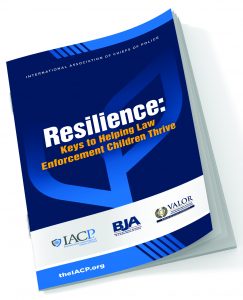Children and teens in law enforcement families may be vulnerable to the stress of having parents in the policing profession.
Whether it is concern for their parents’ safety on the job or experiencing negative comments from their peers about policing, this stress can impact children at critical stages of growth. However, when this stress is addressed positively, it can enhance the child’s personal development and resiliency.
 The IACP’s newly released Resilience: Keys to Helping Law Enforcement Children Thrive booklet was created to assist law enforcement parents with developing their children’s resilience. The booklet emphasizes the importance for young children and adolescents to build the necessary skills to navigate challenges and embrace healthy coping skills. Highlights include general considerations for improving resilience in children and adolescents using 10 strategies.
The IACP’s newly released Resilience: Keys to Helping Law Enforcement Children Thrive booklet was created to assist law enforcement parents with developing their children’s resilience. The booklet emphasizes the importance for young children and adolescents to build the necessary skills to navigate challenges and embrace healthy coping skills. Highlights include general considerations for improving resilience in children and adolescents using 10 strategies.
- Stress Management and Healthy Coping:Stress management and healthy coping activities can serve as the foundation for healthy living. Stress management strategies may include
regular exercise, balanced meals, therapy, and adequate sleep. - Relaxation Strategies:Adopting relaxation strategies can help increase children’s relaxation response and decrease their stress response. Mindfulness, breathing, and muscle relaxation exercises are just a few strategies that parents can practice with their children.
- Social Connections:Experiencing positive social connections at any age can lead to healthy outcomes such as reduced stress and resilience. Encourage children to connect with friends and family members so they can build a supportive network and community.
- Healthy Communication:Encouraging children to effectively communicate and express their feelings builds healthy communication skills. Normalizing and modeling open, two-way discussions also encourage the healthy expression of emotions.
- Creative Expression:Encourage children to voice their feelings through creative expression with activities such as drawing or writing. These therapeutic outlets serve as gateways for children to safely express their frustrations, anxieties, and fears.
- Optimism and Gratitude:It is important for parents to help foster an attitude of optimism and gratitude by modeling these attributes. Encouraging children to practice daily gratitude through a journal or thank you notes enables them to focus on positives rather than negatives.
- Deliberate Acts of Kindness:Performing acts of kindness can teach children to build healthy connections and confidence by shifting their focus to helping others. Participating together in activities like community volunteer work can help them to not dwell on any challenges they may be facing.
- Realistic Goal Setting:When children map out achievable short-term goals for themselves, their confidence and feelings of success increase. These goals can include earning higher grades in school, succeeding in a sports competition, or completing chores at home.
- Healthy Problem-Solving:Practicing collaborative problem-solving skills with children can help to instill feelings of genuine support and comfort and help them feel less isolated. Positive problem-solving also promotes healthy coping options such as journaling, exercising, or meditating.
- Family Bonding Activities:Children can routinely build resilience through quality family time, fun and engaging activities, and meaningful projects. Activities may include family movie or game nights, hiking or walking, and video chats with family. Creating a sense of connection and emotional bonding can aid children’s growth and development.
Coping skills, conversations, and activities to build resilience will look different for every child based on his or her age and maturity level. Parents can try out different strategies to determine which ones work best for their family and look for ways to build those strategies into daily routines.
To support policing parents in adopting these strategies, agencies can provide officers with the tools to mitigate stressors at home and educate them on how to practice these skills effectively with their family members. Agency leaders can share personal examples of how they have practiced gratitude or participated in healthy coping activities to garner buy-in.
It is also important to consider that children in policing families may require additional support outside of the home to cope with the challenges and considerations specific to having a family member in the policing profession.
Please cite as
Breana McKenney and Courtney Boone, “10 Strategies to Help Law Enforcement Children Thrive,” IACP@Work, Police Chief 88, no. 5 (May 2021): 70–71.


